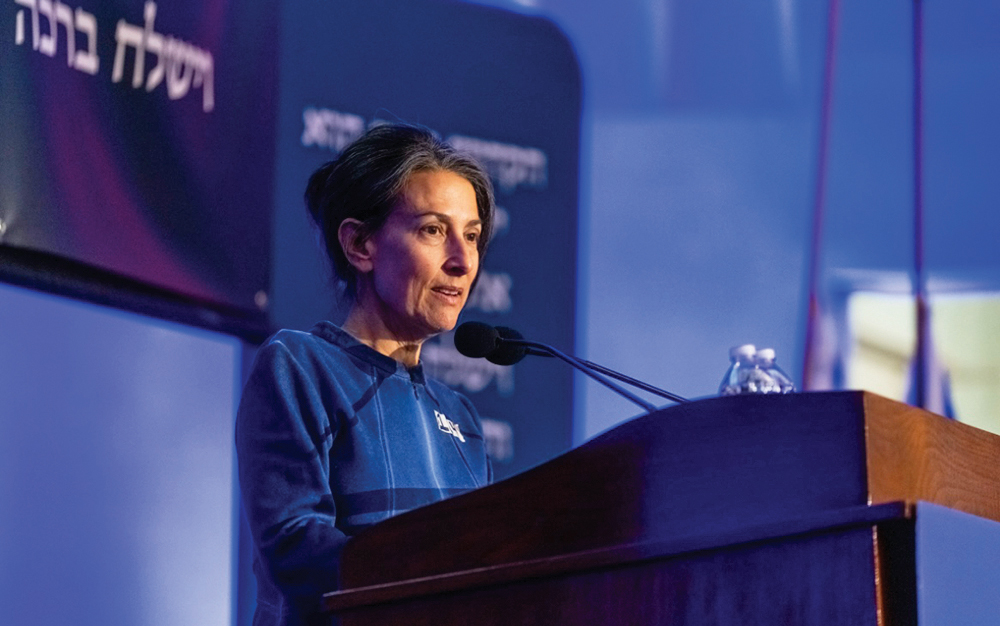
On Sunday, April 7, Yeshiva University hosted an evening of “Unity, Solidarity and Story” to mark six months of the Israel-Hamas war. Speakers included Rachel Goldberg and Jon Polin, the parents of hostage Hersh Goldberg-Polin, as well as a freed hostage, Louis Har. The event was organized by the Sacks-Herenstein Center and the YU Office of Student Life.
Before introducing Goldberg and Polin, Rabbi Dr. Ari Berman, president of YU, addressed the audience. He praised the YU and Stern College students who prayed, put up posters, tied tzitzit for soldiers, organized missions to Israel, marched in rallies and wore masking tape daily showing what day of the war it was. “There was once a time when communities of Jews could be pillaged and murdered and taken hostage without a response, but this is not that time,” Berman said. “There was once a time when antisemitism could rise in countries all around us, and the Jews were powerless to intervene, but this is not that time.
“Not today, not any longer. We have a strong Israel and a strong voice in the Diaspora, and we have you, our students, the leaders of tomorrow, who will stand up now and in the future for Israel and the Jewish people and for those who can’t stand up for themselves. And we join in the efforts with Jews across the globe, saying with one united voice, ‘Bring them home now!’”
Rabbi Dr. Berman chanted this last sentence several times while the entire auditorium joined in, chanting louder each time.
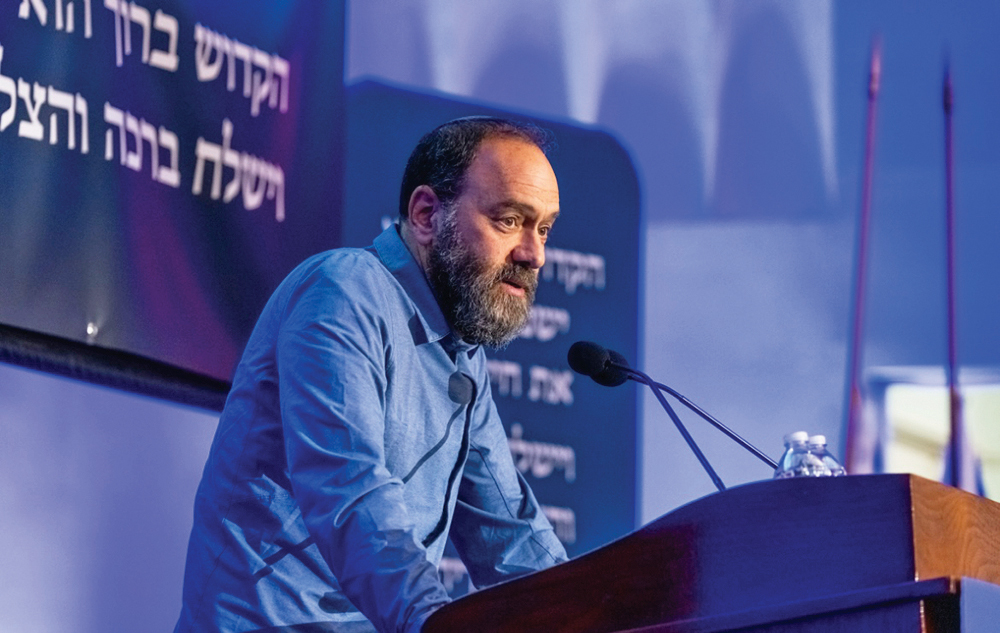
Rachel Golberg came to the podium without papers or notes, looking directly at the audience as she spoke. She began by saying that she didn’t have the privilege of growing up in a religious home. Her parents switched her to the Orthodox day school in Skokie for various reasons when she was in eighth grade. She knew almost nothing about being Orthodox at the time. “So I showed up to school on the first day in what I thought was a wonderful outfit—in my purple corduroy pants,” she said. “I was mortified by my faux pas. But … I got through the entire day—and not one teacher, not one student, not one rabbi, not one administrator said one word to me about it because they knew that I was so embarrassed and they didn’t want to make me feel bad.” When she went home, her mother explained why girls don’t wear pants to Orthodox day schools. “And then I said, ‘That’s the life that I want.’ And I feel blessed that that’s the life I have.”
Goldberg told the audience that she wouldn’t talk about Hersh’s abduction because she knows that most people there know the story. She expressed her gratitude for all the support and love and tefillot from the global Jewish community. “I feel it, Jon feels, we need it, and I’m telling you, and you probably know this already, it will work. And he’s coming home.”
She added that in the months since Hersh was taken, she and her husband have had a lot of time to talk about Hersh. They decided that if there was one word to describe Hersh, it’s “respect.” She gave the example that Hersh came to them a few years ago and told them that he wouldn’t be keeping Shabbat in the way his parents did.
Goldberg continued: “Hersh said, ‘But I will never disrespect you.’ And I thought: ‘How will that work?’ But it did. I never saw Hersh without a kippah—in our house or out—he wore it out of respect for his parents. And in our home I would hear him washing his hands [before eating bread] in the kitchen and I asked him, ‘Why are you still washing?’ He said, ‘Of course I’ll wash when I’m home.’ But the most important thing he did, that meant so much to us, is that he continued going to shul with us on Friday nights and Shabbat mornings, and every holiday, and sat through the entire tefillah with Jon, so that Jon would not sit alone.”
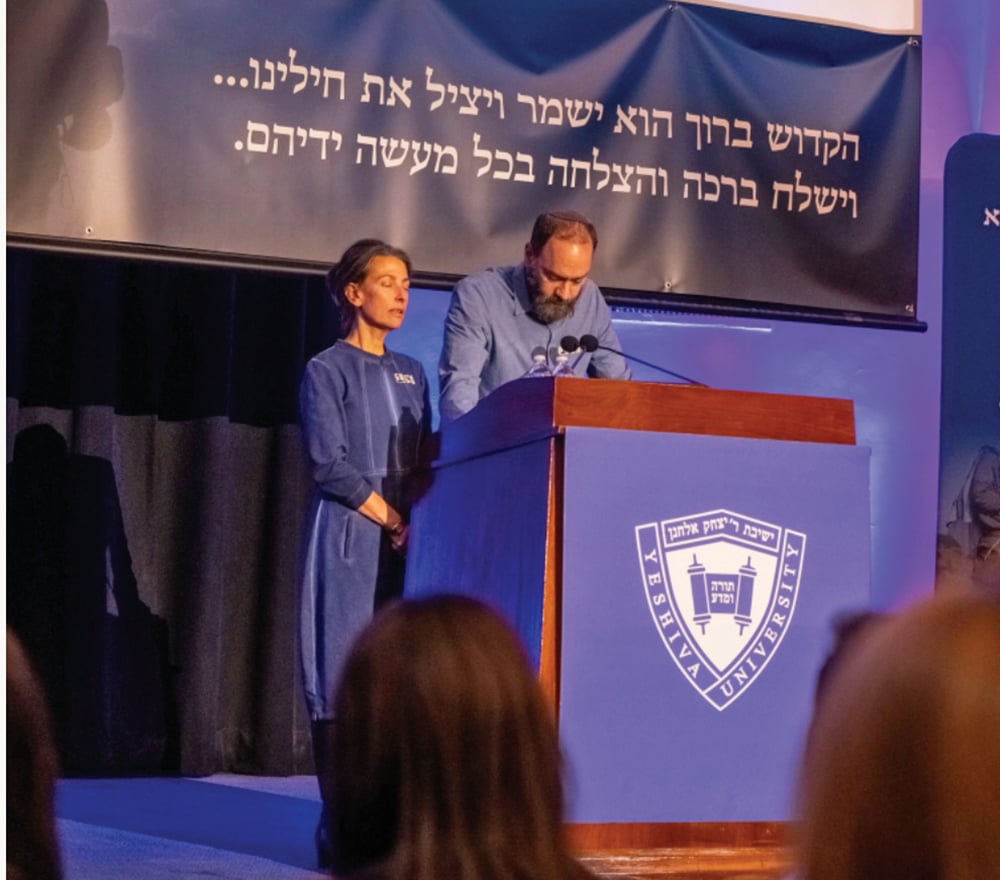
Goldberg spoke about the Torah portion she listened to around eight weeks ago, that included the Ten Commandments. She quoted the verse about honoring one’s parents: “Kabed et avicha v’et imecha l’ma’an ya’arichun yamecha”—”Honor your father and mother in order to lengthen your life.” Hersh has a very long life to live because he honors his father and mother.
“I would like to thank all of you for what you are doing—every single little thing,” she concluded. “We live really far away and we feel what you are doing. Not just Jon and me and my family—but the whole country feels it. You’ve shown up. … When you come because we are in pain, you show us that we are a family. Family shows up when there is pain and suffering. Please don’t stop—because it’s working. And it’s going to work. And we need you. And we love you.”
The entire audience stood up, many wiping away tears.
Jon Polin then spoke. “I have urged so many groups and people to take action.” Polin said, “but I don’t have to do that tonight. Because you in this room have been taking action with tefillot, learning, Tehillim, with trips to Israel, letters of support, with protests, with rallies—you have been showing up, and we thank you so much for that. My only request tonight is that you keep on showing up, as long as is necessary until we bring Hersh and all the other hostages home.”
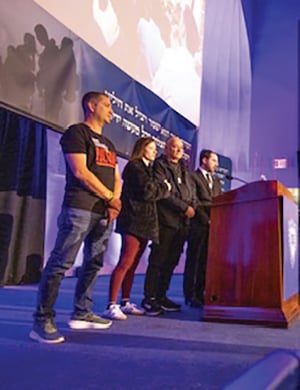
Louis Har, 70, originally from Argentina, was taken hostage from Kibbutz Nir Yitzchak to Gaza by Hamas terrorists on October 7. His partner, Clara Marman, 62, her brother and sister, Fernando Marman and Gabriela Leimberg, as well as Leimberg’s daughter, Mia, 17, were abducted as well. Gabriela, Mia and Clara were released on November 28 as part of the temporary cease-fire deal, but Louis and Fernando were kept in Gaza.
Louis Har and Fernando Marman were rescued from captivity in Rafah in a military operation on February 12 after having been in captivity for 129 days. After the audience watched a brief video of footage of their rescue, Har came to the podium, accompanied by his daughter, Natalie, and her husband, and Rabbi Shay Schachter. After each sentence that he spoke in Hebrew, Rabbi Schachter translated to English.
Har spoke about his abduction. The hostages were moved to different civilian homes several times during their captivity. The captives spoke in Spanish to one another, and made up code-names for the terrorists so that they could talk about them without fear of being understood. They knew they had to do everything they were told, and they knew never to argue. They were kept in darkness the entire time. The terrorists forced them to speak quietly because they were afraid the Israeli drones would pick up their voices. Har said that his family told each other stories, in whispers. to pass the time.
The terrorists tortured the captives with psychological warfare. The hostages were constantly told the lie that Netanyahu wanted all the hostages dead, so even if they would be found, they would be killed by Israel.
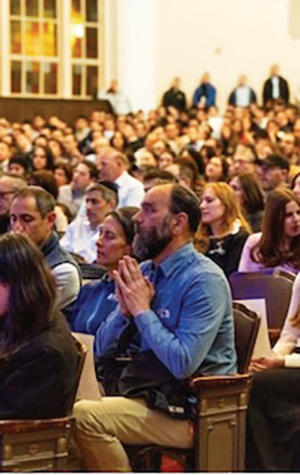
Eventually, the captives heard that hostage deals were taking place. They found out that the women would be freed. Har’s partner Clara Marman didn’t want to leave him, but Har wanted her to go, and she had no choice in any case. Once the three women were freed, Har and Fernando Marman were told that they would be released the next day. They were ready at 7 a.m., only to be crushed with disappointment.
Har shared: “I felt strongly that I was not going to ever want a military operation to get us out, because I was concerned that maybe one of the chayalim in the operation would get injured or killed. I figured I would rather stay there than jeopardize their lives.”
On February 12 at 2 a.m., Har and Fernando heard a huge explosion, which threw them off their mattresses. They assumed the building was hit by a bomb. “In our wildest dreams we didn’t think it was a rescue. Then I suddenly heard [in Hebrew]: ‘Louis! Bo! Bo!’ It’s Tzahal! We have come to bring you home.’” He saw the IDF soldiers and immediately knew he was in good hands. As the soldiers took them out of the building and into the helicopter, Har heard them report “hayahalomim beyadeinu”—“the diamonds are in our hands!” They were all in Israeli territory within the next hour.
The next day, Har said in a statement meant for those soldiers: ”You called us diamonds, but the true diamonds are you—the soldiers who risked your lives to save us.”
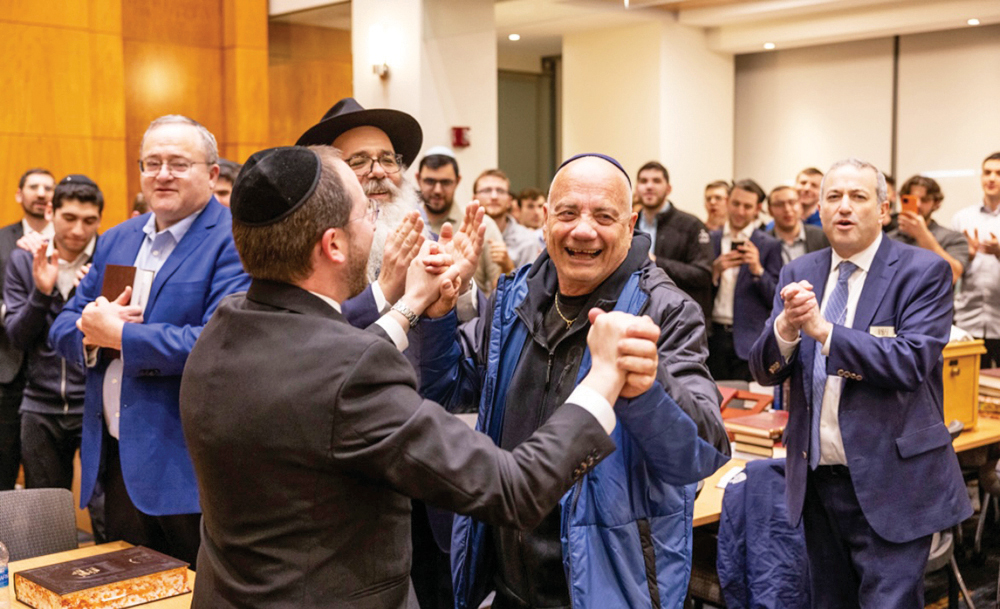
At the conclusion of the program, everyone was invited into YU’s beit midrash to sing and dance with Har, Rabbi Hershel Schachter and Rabbi Shay Schachter. This was particularly moving because the day after Har was freed, Rabbi Shay Schachter guided him in reciting Birkat Hagomel on FaceTime from Israel, while the YU students watched and responded from their beit midrash. As the students sang and danced around Har, and the two rabbis, they sang the Hebrew words that translate to “Save Your people and bless Your inheritance and strengthen us forever”—thanking God for miracles and begging for more.
Dassi Lewis is a staff writer at The Jewish Link.









